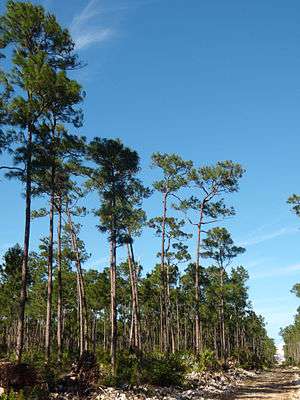Bahamian pineyards
| Bahamian pineyards | |
|---|---|
|
South Andros, The Bahamas | |
| Ecology | |
| Biome | Tropical and subtropical coniferous forests |
| Geography | |
| Area | 2,100 km2 (810 sq mi) |
| Countries | The Bahamas and Turks and Caicos Islands |
| Conservation | |
| Conservation status | Critical/Endangered |
The Bahamian pineyards are a tropical and subtropical coniferous forest ecoregion in The Bahamas and the Turks and Caicos Islands, where they occur on an area of 2,100 km2 (810 sq mi).[1][2] Pineyards are found on four of the northern islands in The Bahamas: Andros, Abaco, Grand Bahama, where they cover half of the island,[3] and New Providence, as well as the Caicos Islands. Pineyards are dominated by Bahamian pine (Pinus caribaea var. bahamensis), while pinepink (Bletia purpurea), bushy beard grass (Andropogon glomeratus), southern bracken fern (Pteridium aquilinum), Florida clover ash (Tetrazygia bicolor), Bahamian trumpet tree (Tabebuia bahamensis), West Indian snowberry (Chiococca alba), devil's gut (Cassytha filiformis), poisonwood (Metopium toxiferum), coontie (Zamia integrifolia) and Florida silver palm (Coccothrinax argentata) grow in the understory. Without regular wildfires, pineyards will be supplanted by broadleafed coppice. Young Bahamian pines require extensive amounts of sunlight to grow, and are resistant to fire once they become adults.[4] Fauna found in the pine forests includes rock iguanas (Cyclura spp.), pygmy boas (Epicrates spp.), the West Indian woodpecker (Melanerpes superciliaris), the Bahama woodstar (Calliphlox evelynae), the Bahama yellowthroat, (Geothlypis rostrata), and the buffy flower bat (Erophylla sezekorni). Kirtland's warblers (Dendroica kirtlandii) migrate from jack pine forests in the Lower Peninsula of Michigan to Bahamian pineyards every year, where they spend the winter.[5]
See also
References
- ↑ "Bahamian pine forests". Terrestrial Ecoregions. World Wildlife Fund. Retrieved 2009-01-15.
- ↑ "Fire Management Assessment of the Caribbean Pine (Pinus caribea) Forest Ecosystems on Andros and Abaco Islands, Bahamas" (PDF). TNC Global Fire Initiative. The Nature Conservancy. September 2004. Retrieved 2009-01-16.
- ↑ Moultrie, Erika. "The Ecosystems of Grand Bahama Island". Grand Bahama Island Tourism Board. Retrieved 2009-01-15.
- ↑ "Ecosystems Of The Bahamas". The Commonwealth of The Bahamas. Retrieved 2009-01-15.
- ↑ World Wildlife Fund (2001). "Bahamian pine forests". WildWorld Ecoregion Profile. National Geographic Society. Archived from the original on 2010-03-08. Retrieved 2009-01-15.
